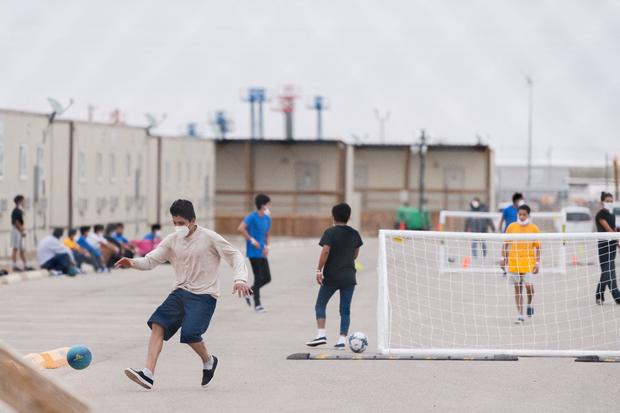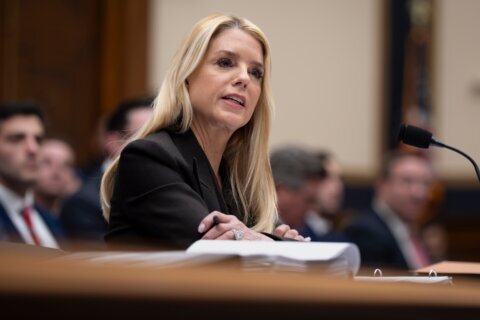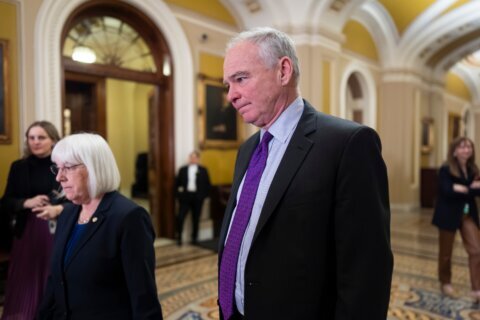Amid pressure from advocates, the Biden administration is reversing course on plans to implement Trump-era regulations that would terminate a long-standing court settlement designed to protect migrant children in U.S. custody, two people familiar with the matter told CBS News.
The 2019 Department of Health and Human Services (HHS) rule was part of a pair of regulations designed to replace the landmark Flores Settlement Agreement, which has governed the care of children in U.S. immigration custody since 1997 through strict standards for government shelters and detention sites.
On Friday, the administration omitted the HHS rule from its fall unified agenda of regulations, despite including it in the spring agenda earlier this year. The decision to discard the Trump-era rule came after months of internal debate, a Biden administration official familiar with the deliberations told CBS News.
For decades, the Flores settlement has allowed non-profit lawyers to inspect facilities housing migrant children, ensure officials are providing adequate care and services to minors in U.S. custody, and seek relief in federal court if they determine the government is violating the terms of the agreement.
It is expected the Biden administration will now work on its own rules to codify the Flores settlement, which was always intended to be replaced by regulations. Advocates have called on the administration to set up an oversight mechanism to ensure migrant children receive adequate care before moving to end the settlement.
“Even when, as is the case now, leadership is committed to ensuring that children’s rights are being upheld, independent oversight is essential,” said Neha Desai, one of the lawyers representing migrant youth in the Flores case. “Through multiple administrations, our interviews with children have repeatedly revealed deeply concerning violations of the Settlement; violations that compromise the basic health and safety of children.”

The Trump administration strongly criticized the Flores agreement, calling it a “loophole” that encouraged migrant families and children to cross the U.S. border illegally. Officials were particularly critical of a ruling in the Flores case that generally bars the government from detaining migrant families for longer than 20 days.
In the summer of 2019, the Trump administration published two sets of regulations to replace the Flores settlement, an HHS one to govern the care of unaccompanied minors and a Department of Homeland Security (DHS) rule that would allow the government to detain migrant families with children indefinitely.
The 2019 regulations elicited strong criticism from advocates for immigrants and Democratic lawmakers when they were published by the Trump administration. Opponents of the regulations denounced them as an effort to gut legal safeguards for migrant children, and the rules were quickly blocked by a federal court.
In December 2020, the Ninth Circuit Court of Appeals partially upheld a ruling against the regulations, blocking the DHS rules that would have allowed for the indefinite detention of families while their asylum cases were processed.
But the appeals court allowed the government to implement the rules published by HHS, which operates shelters and other housing sites for migrant children who enter U.S. border custody without their parents. As of Friday morning, HHS was housing 13,072 unaccompanied children, according to agency data.
In June, the Biden administration quietly announced it intended to implement the HHS regulations for unaccompanied children after making some changes required by the Ninth Circuit ruling, as well as a “technical correction.”
As part of a deal with Democratic-led states that challenged the 2019 rules, the Biden administration would have been able to end the Flores settlement — as it pertains to HHS shelters — 180 days after issuing a final rule.
The termination of the Flores agreement would no longer guarantee non-profit lawyers access to HHS shelters for unaccompanied children or the ability to ask a federal court to enforce the settlement if its provisions are breached by the government.
The prospect alarmed advocates for migrant children, who staged a forceful behind-the-scenes push to urge the Biden administration to scrap the Trump-era rules and work on new regulations from scratch.
In August, dozens of advocacy groups implored officials at the Office of Refugee Resettlement, the HHS agency that houses migrant children, to create “robust oversight mechanisms” for monitoring shelter conditions before moving to end the Flores agreement, according to a letter obtained by CBS News.
As part of the litigation mounted by Democratic-led states, the Biden administration agreed to suspend the most controversial provision of the HHS regulations: a rule that would give officials more leeway to strip the unaccompanied minor designation, as well as the accompanying legal protections, from children determined to have parents “available” to care for them in the U.S.
Under U.S. law, unaccompanied children are shielded from expedited deportations and allowed to seek asylum through child-sensitive interviews, as opposed to before an adversarial immigration judge.







